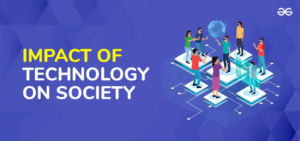Technology’s Impact on society in 20 years is challenging, however primarily based on modern trends, countless transformative adjustments are possibly to have an effect on society deeply. Here are some key areas the place technological know-how may want to form the future:

Technology’s Impact on Society in 20 Years
1. Work and Employment
Automation and AI: Automation will in all likelihood exchange many events jobs throughout industries, from transportation to manufacturing. AI-powered robots, software, and independent machines can also manage repetitive tasks, doubtlessly main to great shifts in the job market. However, new jobs in AI development, robotics, facts analysis, and human-centered fields (like care work) are additionally anticipated to emerge.
Remote and Gig Work: Advancements in verbal exchange and collaborative technologies ought to lead to similarly normalization of far flung and gig work. Global collaboration will end up easier, permitting organizations to faucet into a broader Genius pool. However, these adjustments might also additionally demand new insurance policies for employment benefits, earnings stability, and workers’ rights.
2. Healthcare and Biotechnology
Personalized Medicine: Advances in genomics, AI, and information science may also make healthcare extra personalized. Genetic evaluation and predictive algorithms will assist medical practitioner tailor remedies to man or woman patients, probably growing efficacy and lowering facet effects.
Health Monitoring: Wearable gadgets and fitness sensors will probably play a important function in preventive healthcare. Integrated monitoring structures would possibly predict and become aware of fitness problems early, even earlier than signs appear, main to higher fitness results and perhaps extending lifestyles expectancy.
Biotechnology and Genetic Engineering: CRISPR and different gene-editing equipment would possibly tackle genetic issues and inherited conditions, however they elevate moral questions, in particular round human enhancement and “designer” traits.
3. Education and Learning
AI and Personalized Learning: Adaptive studying systems may want to use AI to tailor academic experiences, making getting to know greater fantastic for individuals. This may want to limit inequalities by means of giving customized aid to college students who may additionally want extra assets or choice getting to know paths.
Virtual and Augmented Reality (VR/AR): VR and AR ought to make schooling extra immersive, permitting college students to discover historic events, operate science experiments, or exercise real-world capabilities in a safe, digital environment.
Global Access to Education: Digital schooling platforms, which have already multiplied get admission to to knowledge, will possibly evolve to provide a broader vary of affordable, brilliant training globally. However, the digital divide stays a challenge.
4. Environment and Sustainability
Green Technology: Renewable electricity sources, like solar, wind, and bioenergy, will probably emerge as greater environment friendly and affordable. Advances in battery storage and clever grids may want to seriously change how we generate, store, and distribute energy, assisting to fight local weather change.
Agriculture and Food Production: Vertical farming, lab-grown meat, and genetically modified plants might also assist feed a developing populace with a decrease environmental footprint. Precision agriculture—using sensors and AI to display crop fitness and optimize yields—could similarly raise efficiency.
Climate Monitoring and Adaptation: Satellites, sensors, and AI fashions might also furnish records to assist screen environmental adjustments in real-time, enabling governments and communities to reply greater efficiently to herbal mess ups and altering ecosystems.
5. Privacy, Ethics, and Security
Data Privacy: As records series turns into even extra pervasive, privateness issues will escalate. People will want to navigate a world the place their things to do are tracked extra closely, and legal guidelines may additionally evolve to shield private data, in particular as extra gadgets emerge as connected.
Cybersecurity: The upward shove of interconnected gadgets (IoT) will require more advantageous protection measures to stop cyber threats. Quantum computing may want to revolutionize encryption however would possibly additionally make modern cybersecurity strategies obsolete, necessitating new solutions.
Ethical AI and Algorithm Transparency: The moral implications of AI—such as biases in algorithms and the viable for mass surveillance—will be key areas for discussion. Policymakers, ethicists, and technologists may also want to set up standards to make certain AI is truthful and transparent.
6. Human Interaction and Society
Social Media and Mental Health: Social media will probably proceed to structure how humans join and communicate. While it can foster world communities, it may also additionally have an effect on intellectual health, private identity, and societal values. In response, there might also be extra legislation and higher equipment to control its effects technology’s impact on Society in 20 Years.
Augmented Reality in Daily Life: AR ought to end up a great section of how we navigate every day life, from protecting digital statistics on the actual world to bettering social interactions. Glasses, contact lenses, or different AR gadgets may additionally combination digital and bodily realities extra seamlessly.
Cultural and Ethical Shifts: As science blurs boundaries—between work and life, public and private, actual and virtual—society may also see modifications in values, ethics, and cultural norms. This should have an effect on the whole thing from privacy expectations to the idea of fact itself.
7. The Rise of Smart Cities and Connected Communities
IoT and Infrastructure: Smart town applied sciences will enhance visitors management, power usage, waste disposal, and public services, making city dwelling extra efficient. This infrastructure ought to beautify first-rate of lifestyles however additionally brings surveillance and privateness challenges technology’s impact on society in 20 years.
Autonomous Transportation: Autonomous cars, drones, and public transportation should enhance mobility, limit accidents, and exchange metropolis planning. Reduced want for parking and extra environment friendly transit picks may additionally reshape city landscapes.
Conclusion
The coming a long time promise a transformative fusion of science and each day life, with the viable for profound benefits, from fitness developments and increased training to sustainability efforts. However, these advantages will be balanced by way of challenges associated to privacy, employment, and moral considerations. Society’s capability to adapt, set up new policies, and tackle moral questions will play a vast position in making sure that science advantages all human beings equitably.
